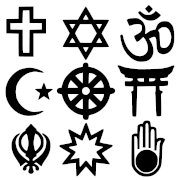
Let's look at this a little:
The Chinese word Li means reason, logic, science, theory, inner principle, or structure. This is in agreement with the Greek word logos which means reason as well as speech. Heraclitus used it for the principle which controls the universe. The Stoics used this word to signify the anima mundi the soul of the world. And Marcus Aurelius spoke of spermatikos logos as the generative principle in nature. Of course this word is best known for its usage in Christianity, particularly the Johanine writings. Most famous of all is the opening verse in John's gospel,
With this being said, it in not accurate to say that Li- principle is personalized within Confucianism. For though having its roots in a metaphysical reality, as we believe in the metaphysical reality of God, this principle is not necessarily a "person" as we ascribe to the Second Person of the Trinity, the Logos.
Within Neo-Confucianism Ch'en Ch'un (d.1223) taught that Li- principle is identical to Tao, though with the differentiating nuance that Tao is the Way that men can follow forever, and Li is that Principle which will forever be unchanging. The concept of T'ai-Chi (the Great Ultimate) is here seen as the metaphysical reality that is the eternal harmony of all things. This term is often paired with Wu-Chi, the Great Non-Ultimate. Within Taoism, the Great Ultimate is the Tao that can be named, and the Great Non-Ultimate is Tao that cannot be named, beyond all being and delimitation. As Wing-tsit Chan (d.1994) explained, these two terms represent a single reality, the Principle, but from two different points of view. "The Non-Ultimate is the state of reality before the appearance of forms whereas the Great Ultimate is the state after the appearance of forms."- Source Book, pp.464-65.
This is right in tune with God as presented in Judeo-Christian Scriptures. But of course with the main difference that one is impersonal, the other is personalized. For God, Who is identified as the Logos (Jn 1:1) can also be seen as Wu-Chi, and T'ai-Chi. For God is the Non-manifest deity, which is correlative to Wu-Chi, the Non-Ultimate; and He is Manifest deity which corresponds to T'ai-Chi the Great Ultimate. Thus the Non-manifest, and the Manifest deity are One God, and One Logos from different points of view. As Jesus said, neither knoweth any man the Father, save the Son- Mt 11:27b, which would be the Unknowable Essence of Li as Wu-Chi; and he to whomsoever the Son will reveal him- refers to God as He has revealed Himself to Himself, and to the Cosmos is Li as T'ai-Chi.
A final thought on this is that of Ch'i, which is the vital-energy, wind, or breath permeating all things within the material Cosmos. As Chu Hsi (d.1200) taught, Ch'i and Li are two sides of the same reality. Li is hidden, and Ch'i is manifest. This is the same idea between Wu-Chi, and T'ai-Chi but on a different level. Thus when Li is non-manifest as Tao, it is Wu-Chi, but when manifest as Tao, it is T'ai-Chi. Then once Li-principle is manifest (as the Great Ultimate), it is non-manifest, at least in relation to the Cosmos until that Ch'i is "breathed forth", then Li is manifest with all its forms within the Cosmos.
The idea of Ch'i, though a materialist doctrine on one hand, is akin to the concept of the Holy Spirit in relation to the Father and Son of the Trinity. As Jesus said, He shall glorify me: for he shall receive of mine, and shall show it unto you.- Jn 16:14. And Scripture also states, Thou sendest forth thy spirit, they are created: and thou renewest the face of the earth.- Ps 104:30. Thus the Holy Spirit is sent forth, as the concept of Ch'i, and manifests the Principle that is the Logos in all His glories within the Cosmos. This is done first as creation, then second as a perpetual renewing of the Cosmos' existence at each moment.
Thus we see Li-principle as the Logos, manifest and non-manifest first revealing the Great Ultimate, Who is Manifest deity, second revealing the material Cosmos through the ch'i-like agency of the Holy Spirit.
Peace and blessings.

